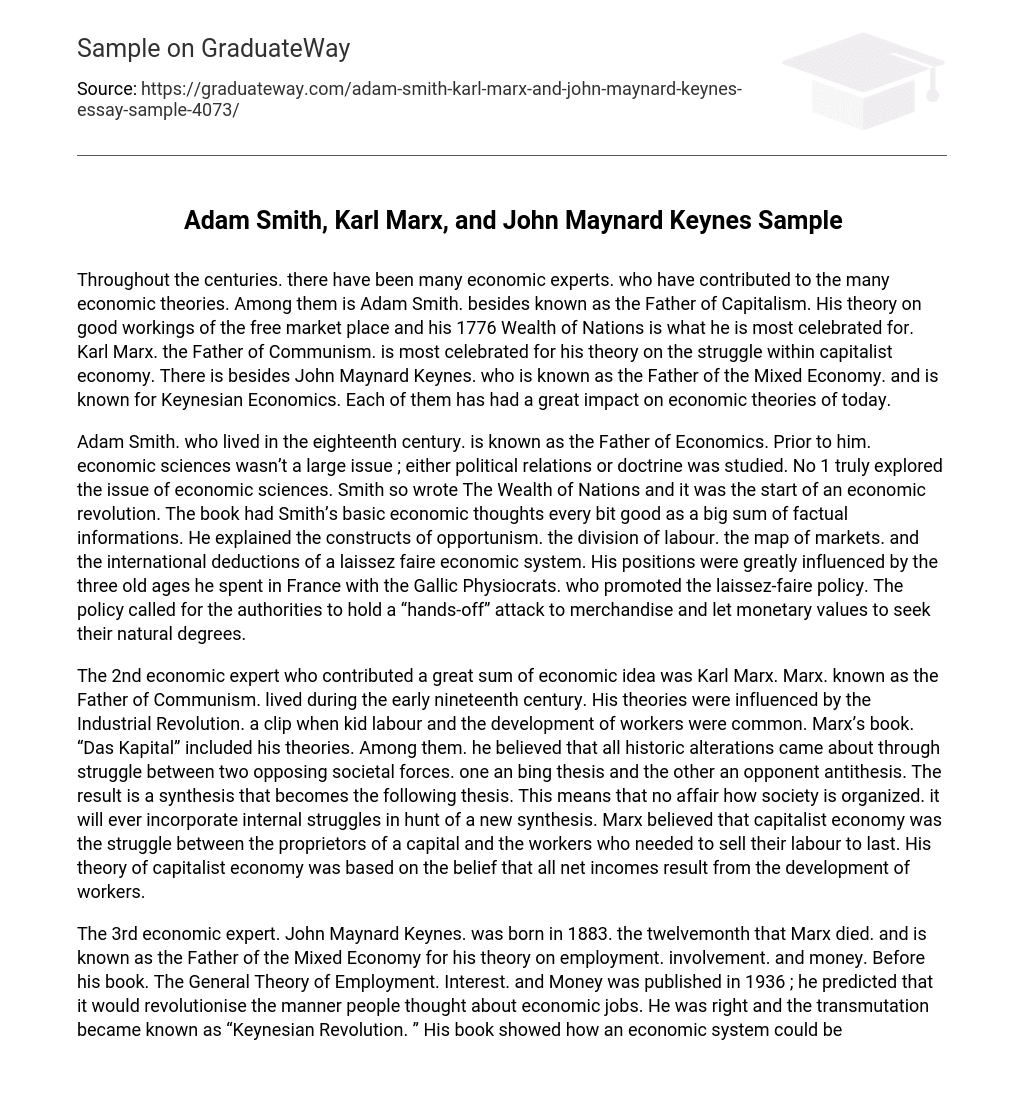Throughout the centuries. there have been many economic experts. who have contributed to the many economic theories. Among them is Adam Smith. besides known as the Father of Capitalism. His theory on good workings of the free market place and his 1776 Wealth of Nations is what he is most celebrated for. Karl Marx. the Father of Communism. is most celebrated for his theory on the struggle within capitalist economy. There is besides John Maynard Keynes. who is known as the Father of the Mixed Economy. and is known for Keynesian Economics. Each of them has had a great impact on economic theories of today.
Adam Smith. who lived in the eighteenth century. is known as the Father of Economics. Prior to him. economic sciences wasn’t a large issue ; either political relations or doctrine was studied. No 1 truly explored the issue of economic sciences. Smith so wrote The Wealth of Nations and it was the start of an economic revolution. The book had Smith’s basic economic thoughts every bit good as a big sum of factual informations. He explained the constructs of opportunism. the division of labour. the map of markets. and the international deductions of a laissez faire economic system. His positions were greatly influenced by the three old ages he spent in France with the Gallic Physiocrats. who promoted the laissez-faire policy. The policy called for the authorities to hold a “hands-off” attack to merchandise and let monetary values to seek their natural degrees.
The 2nd economic expert who contributed a great sum of economic idea was Karl Marx. Marx. known as the Father of Communism. lived during the early nineteenth century. His theories were influenced by the Industrial Revolution. a clip when kid labour and the development of workers were common. Marx’s book. “Das Kapital” included his theories. Among them. he believed that all historic alterations came about through struggle between two opposing societal forces. one an bing thesis and the other an opponent antithesis. The result is a synthesis that becomes the following thesis. This means that no affair how society is organized. it will ever incorporate internal struggles in hunt of a new synthesis. Marx believed that capitalist economy was the struggle between the proprietors of a capital and the workers who needed to sell their labour to last. His theory of capitalist economy was based on the belief that all net incomes result from the development of workers.
The 3rd economic expert. John Maynard Keynes. was born in 1883. the twelvemonth that Marx died. and is known as the Father of the Mixed Economy for his theory on employment. involvement. and money. Before his book. The General Theory of Employment. Interest. and Money was published in 1936 ; he predicted that it would revolutionise the manner people thought about economic jobs. He was right and the transmutation became known as “Keynesian Revolution. ” His book showed how an economic system could be stuck at an equilibrium end product degree far below full employment because of deficient corporate demand. Keynes believed authorities should take an active function in conveying the economic system out of the depression by shooting authorities disbursement into the income watercourse. This meant that increased economic disbursement by authorities at a clip of worsening revenue enhancement grosss would ensue in big budget shortages. Among the radical thoughts presented by Keynes was the construct of a demand-determined equilibrium wherein unemployment is possible. the ineffectualness of monetary value flexibleness to bring around unemployment. and the possibility of utilizing authorities money to assist extinguish recessions and command economic roars. Using his book. he constructed the basic relationships and thoughts behind “macroeconomics. ”





